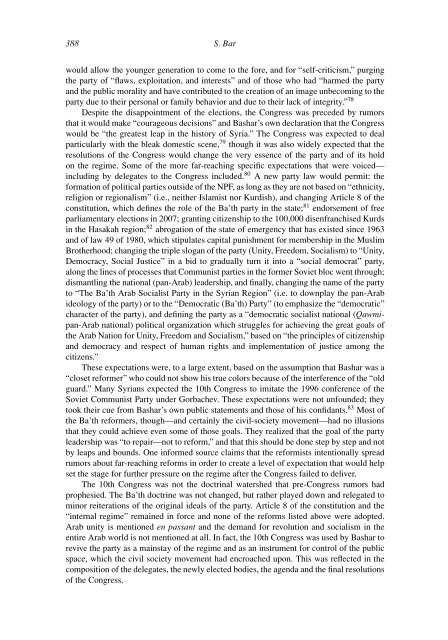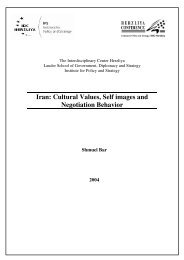Bashar’s <strong>Syria</strong> 387hopes on the 10th Regional Congress <strong>and</strong> were deeply frustrated by <strong>its</strong> lukewarm conclusion.<strong>The</strong>se nascent reform tendencies have been further dampened by the international crisis inthe wake of the assassination of former Lebanese Prime Minister Rafiq al-Hariri <strong>and</strong> theMehlis report. <strong>The</strong> sense of a foreign conspiracy against <strong>Syria</strong> has been exploited by theleadership to shore up domestic support <strong>and</strong> suppress voices for reform.<strong>The</strong> question of the relations between the Ba’thist reformists <strong>and</strong> Bashar al-Asad isone of the most debated issues in <strong>Syria</strong>. On one h<strong>and</strong> there is no doubt that Bashar is closeto many of the reformists, particularly those affiliated with the <strong>Syria</strong>n Computer Society.Many of these, though, are academicians who are not active in the party or even are not partymembers. Even those reformists who are party activists are mid-level members without largeconstituencies <strong>and</strong> without patronage networks of their own. So even if Bashar likes theirideas, many of them are impractical on a political level. 72 This is because, at the end of theday, implementation of ideas in the <strong>Syria</strong>n regime requires the support of the bureaucracy,which believes it will be damaged by reforms <strong>and</strong> modernization.<strong>The</strong> 10th Regional Congress was held under the slogan of “development, renewal <strong>and</strong>reform” (tatwir, tahdith wa-islah). <strong>The</strong> “reformist” trend was evident already in the campaigningof the c<strong>and</strong>idates for the 10th Regional Congress. Those who were elected did notmention Lebanon or <strong>Syria</strong>’s foreign relations; their focus was almost exclusively domestic.<strong>The</strong> c<strong>and</strong>idates called for administrative reforms, improving the public sector, broadeningthe free market, <strong>and</strong> improving healthcare <strong>and</strong> schools. All asked for better qualified publicservants <strong>and</strong> administrative reform. Many of them criticized the opportunism of the partyleadership (stopping short of the president, of course) <strong>and</strong> the system of clientalism <strong>and</strong>patronage.<strong>The</strong> results of the elections for the delegates to the Congress (April 2005) precipitatedprotest among Ba’th members in the branches of Damascus <strong>and</strong> the University of Damascus.<strong>The</strong> elections for the posts of secretary of the local branch (far’a) <strong>and</strong> sub-branches (shu’ba)returned all the old party officials without even one new c<strong>and</strong>idate. Since party proceduresactually precluded simultaneous change of more than ten percent of the party leadership,there was no expectation of a sea change. <strong>The</strong> results, though, were seen as far exceeding themost cynical warnings. <strong>The</strong> frustration of the young party members found <strong>its</strong> way into thealternative press of “civil society” <strong>and</strong> the internet. <strong>The</strong>y claimed that the incumbent partyleaders had prevented them from campaigning <strong>and</strong> presenting their resumes <strong>and</strong> positions,<strong>and</strong> did not even publish the names of c<strong>and</strong>idates. Since both c<strong>and</strong>idates <strong>and</strong> voters didnot hold frequent party meetings, most voters did not know the new c<strong>and</strong>idates. A petitionwas circulated by prominent reform-minded party members (one name associated with thispetition was a Bashar confidante, Ayman ‘Abd al-Nour) complaining about the corruption ofthe elections <strong>and</strong> dem<strong>and</strong>ing that 100 known reformers be added to the Party Congress. Asa result, 100–150 delegates were added at the last moment, including the reformist Ayman‘Abd al-Nour, who had failed to be elected in his own branch. 73Nevertheless, the general sense among the reformists was one of failure. 74 Accordingto one individual who witnessed the preparations for the Congress <strong>and</strong> <strong>its</strong> deliberations,“the old vested interests won out . . . new reformers were closed out of the election process<strong>and</strong> almost all the old regional leaders <strong>and</strong> district leaders were voted back in because itwas illegal to campaign. <strong>The</strong> political machine ensured that <strong>its</strong> leaders would retain theircars, offices <strong>and</strong> privileges.” 75 This complaint was raised not only by young would-bedelegates, but by some older party members such as Dr. Zuhayr Ibrahim Jabour of TishreenUniversity 76 <strong>and</strong> Dr. Ahmad al-Hajj Ali, a member of the Ba’th “Committee to DevelopParty Thought” <strong>and</strong> ex-head of the Bureau of the Central Committee. 77 Even some of theparty’s official propag<strong>and</strong>ists joined the call for democratization at the branch level that
388 S. <strong>Bar</strong>would allow the younger generation to come to the fore, <strong>and</strong> for “self-criticism,” purgingthe party of “flaws, exploitation, <strong>and</strong> interests” <strong>and</strong> of those who had “harmed the party<strong>and</strong> the public morality <strong>and</strong> have contributed to the creation of an image unbecoming to theparty due to their personal or family behavior <strong>and</strong> due to their lack of integrity.” 78Despite the disappointment of the elections, the Congress was preceded by rumorsthat it would make “courageous decisions” <strong>and</strong> Bashar’s own declaration that the Congresswould be “the greatest leap in the history of <strong>Syria</strong>.” <strong>The</strong> Congress was expected to dealparticularly with the bleak domestic scene, 79 though it was also widely expected that theresolutions of the Congress would change the very essence of the party <strong>and</strong> of <strong>its</strong> holdon the regime. Some of the more far-reaching specific expectations that were voiced—including by delegates to the Congress included. 80 A new party law would permit: theformation of political parties outside of the NPF, as long as they are not based on “ethnicity,religion or regionalism” (i.e., neither Islamist nor Kurdish), <strong>and</strong> changing Article 8 of theconstitution, which defines the role of the Ba’th party in the state; 81 endorsement of freeparliamentary elections in 2007; granting citizenship to the 100,000 disenfranchised Kurdsin the Hasakah region; 82 abrogation of the state of emergency that has existed since 1963<strong>and</strong> of law 49 of 1980, which stipulates capital punishment for membership in the MuslimBrotherhood; changing the triple slogan of the party (Unity, Freedom, Socialism) to “Unity,Democracy, Social Justice” in a bid to gradually turn it into a “social democrat” party,along the lines of processes that Communist parties in the former Soviet bloc went through;dismantling the national (pan-Arab) leadership, <strong>and</strong> finally, changing the name of the partyto “<strong>The</strong> Ba’th Arab Socialist Party in the <strong>Syria</strong>n Region” (i.e. to downplay the pan-Arabideology of the party) or to the “Democratic (Ba’th) Party” (to emphasize the “democratic”character of the party), <strong>and</strong> defining the party as a “democratic socialist national (Qawmipan-Arabnational) political organization which struggles for achieving the great goals ofthe Arab Nation for Unity, Freedom <strong>and</strong> Socialism,” based on “the principles of citizenship<strong>and</strong> democracy <strong>and</strong> respect of human rights <strong>and</strong> implementation of justice among thecitizens.”<strong>The</strong>se expectations were, to a large extent, based on the assumption that Bashar was a“closet reformer” who could not show his true colors because of the interference of the “oldguard.” Many <strong>Syria</strong>ns expected the 10th Congress to imitate the 1996 conference of theSoviet Communist Party under Gorbachev. <strong>The</strong>se expectations were not unfounded; theytook their cue from Bashar’s own public statements <strong>and</strong> those of his confidants. 83 Most ofthe Ba’th reformers, though—<strong>and</strong> certainly the civil-society movement—had no illusionsthat they could achieve even some of those goals. <strong>The</strong>y realized that the goal of the partyleadership was “to repair—not to reform,” <strong>and</strong> that this should be done step by step <strong>and</strong> notby leaps <strong>and</strong> bounds. One informed source claims that the reformists intentionally spreadrumors about far-reaching reforms in order to create a level of expectation that would helpset the stage for further pressure on the regime after the Congress failed to deliver.<strong>The</strong> 10th Congress was not the doctrinal watershed that pre-Congress rumors hadprophesied. <strong>The</strong> Ba’th doctrine was not changed, but rather played down <strong>and</strong> relegated tominor reiterations of the original ideals of the party. Article 8 of the constitution <strong>and</strong> the“internal regime” remained in force <strong>and</strong> none of the reforms listed above were adopted.Arab unity is mentioned en passant <strong>and</strong> the dem<strong>and</strong> for revolution <strong>and</strong> socialism in theentire Arab world is not mentioned at all. In fact, the 10th Congress was used by Bashar torevive the party as a mainstay of the regime <strong>and</strong> as an instrument for control of the publicspace, which the civil society movement had encroached upon. This was reflected in thecomposition of the delegates, the newly elected bodies, the agenda <strong>and</strong> the final resolutionsof the Congress.
- Page 4 and 5: Bashar’s Syria 355of political im
- Page 8 and 9: Bashar’s Syria 359a-Zur province
- Page 11: 362 S. Barof Lebanon, with which Sy
- Page 17 and 18: 368 S. Barnaturally come with the s
- Page 19 and 20: 370 S. BarSimilar behavior on the p
- Page 21 and 22: 372 S. Bardemocracy” must be foun
- Page 23 and 24: 374 S. Barcultural, political and m
- Page 25 and 26: 376 S. Barexcept for those with fam
- Page 27 and 28: 378 S. Barthe provisions for nonpro
- Page 29 and 30: 380 S. Bar The ups and downs in rel
- Page 31 and 32: 382 S. Barfamily is also linked by
- Page 33 and 34: 384 S. Bar2. The “second generati
- Page 35: 386 S. BarThe reformist trend withi
- Page 39 and 40: 390 S. BarFigure 3. Heads of the Sy
- Page 41 and 42: 392 S. Bar Disruption of the “hie
- Page 43 and 44: 394 S. Bar(Majlis Milli), composed
- Page 45 and 46: 396 S. Bar Other prominent Syrians
- Page 47 and 48: 398 S. BarSyrian civil society—su
- Page 49 and 50: 400 S. BarMany of the Muslim Brothe
- Page 51 and 52: 402 S. BarThese elements find reson
- Page 53 and 54: 404 S. BarIran’s proxy, Hezbollah
- Page 55 and 56: 406 S. BarWest—and specifically t
- Page 57 and 58: 408 S. BarBashar is well aware that
- Page 59 and 60: 410 S. BarBashar did not read these
- Page 61 and 62: 412 S. Bartoken withdrawal while ma
- Page 63 and 64: 414 S. Barlegitimacy had eroded. Ne
- Page 65 and 66: 416 S. Barin the wake of the al-Har
- Page 67 and 68: 418 S. BarIt was Russia, however, t
- Page 69 and 70: 420 S. Baror so, with competitive p
- Page 71 and 72: 422 S. Bar10. According to the well
- Page 73 and 74: 424 S. Bar44. See Flynt Everett, In
- Page 75 and 76: 426 S. Barinternet news site, all4s
- Page 77 and 78: 428 S. Bar100. As one Sunni Syrian
- Page 79 and 80: 430 S. Bar125. Radio Damascus, 21 O
- Page 81 and 82: 432 S. BarBengio, Ofra and Gabriel
- Page 83 and 84: 434 S. BarNews agencies and Newspap
- Page 85 and 86: Regional Command;Central CommitteeR
- Page 87 and 88:
Main Figures in the Syrian Ba’th
- Page 89 and 90:
Main Figures in the Syrian Ba’th
- Page 91 and 92:
Main Figures in the Syrian Ba’th
- Page 93 and 94:
Main Figures in the Syrian Ba’th
















